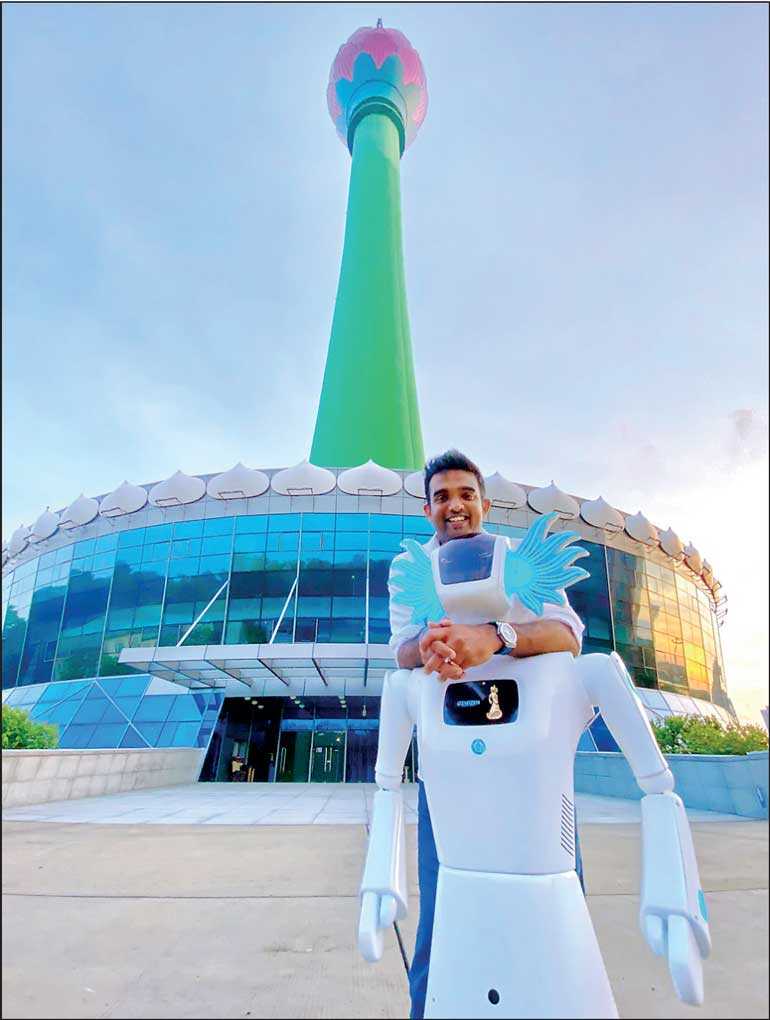Tuesday Feb 17, 2026
Tuesday Feb 17, 2026
Friday, 4 September 2020 00:00 - - {{hitsCtrl.values.hits}}

Arimac Founder/CEO Chamira Jayasinghe has controversial views on the significance of harnessing digital innovation to elevate the GDP of the country and cut debts of the country.
Arimac, with its trademark ‘Digital Disruption,’ has revolutionised the corporate digital landscape of Sri Lanka through the transformational upliftment of the digital standards of many multinationals and blue chips over the past nine years.
 |
| Arimac Founder/CEO Chamira Jayasinghe |
Arimac has also achieved milestones in robotics that gave birth to Diyazen, the pioneering humanoid robot in South Asia, and large-scale international projects such as the United Nations Butterfly Effect campaign which it developed to be featured at the General Assembly 2019 in New York, the creation of the official website for the President of the Maldives, and the first-ever, real-time ‘redeem miles and earn platform’ in the world for an airline called ‘Etihad Guest’, developed for Etihad. These have all placed Sri Lanka firmly on the map in digital revolutionising.
Following are excerpts of an interview with Jayasinghe:
Q: Do you think that a digital economy can increase competitiveness and wealth distribution?
A: The international competitiveness of a country is crucial for the prosperity of its people. If an economy is competitive, domestic companies can sell their products at home and abroad. This secures jobs and generates income for employees. With improved competitiveness, the country can produce better and a higher number of goods and services at a competitive price with larger volumes and thus increase GDP and GDP per inhabitant. Global prosperity is being redistributed: A successful digital transformation increases people’s prosperity. In countries that fail to do so, GDP per inhabitant falls. The digital transformation of one’s own economy thus becomes a prerequisite for securing and improving a country’s prosperity.
If you take the Big Five in the US – Apple, Amazon, Facebook, Alphabet (Google), and Microsoft, their combined worth in 2017 was $ 3.5 trillion, while the entire economy of the United Kingdom is $ 2.6 trillion. Sri Lanka’s GDP is microscopic at USD 92 Billion in 2020. The potential for technology to massively impact a country’s GDP is huge.
Although statistically this level of success has been limited to America and developed nations, China’s Tencent (WeChat) has now achieved mammoth growth. This is mainly due to the size of the country and their capacity to test innovations and achieve phenomenal success within China which thereafter tends to get adopted by the rest of the world, such as Ali Baba for example.
We may not be there yet, but having been in a leadership position in this Industry for nearly nine years, I fervently believe that we harbour a lot of sharp young minds that are brimming with innovation that surpasses that of developed nations. If this is carefully nurtured, we too could create the next world-changing, ground-breaking app or innovation.
We need to take this seriously with the help of the Government and key stakeholders such as big corporates. Collectively we can break barriers and alter the digital landscape of Sri Lanka.
I strongly believe that to raise our GDP and to diminish our debts the route that we must take is through the revolutionising of the digital sphere. If you take Mark Zuckerberg, his personal net worth of $ 96 b is nearer to double the total foreign debt of Sri Lanka at $ 55.9 b, according to a Central Bank report issued recently.
What can be earned through manufacturing is less when compared to the incredible contribution that effective digitalisation has the potential of making to the nation and the world. Our barriers to entry are limited in the tech industry. A singular idea or even a game, can bring you unprecedented success. In juxtaposition, manufacturers have large barriers to entry, starting from the investment in infrastructure and massive overheads.
Q: What do you think is the most important step we need to take to achieve this step into the future?
A: At Arimac we have actively striven to develop and nurture young tech evangelists. We vigorously engage with university students and on-board them and develop their skills and enhance their passion for the Industry. We have trained hundreds and thousands of people over the years.
Most of our employees are such graduates that we have selected to join our team and who have an unbridled passion to make an impact. We are also actively recruiting people without any tertiary qualifications but who are passionate technophiles and creative wizards. We have employees who have made massive strides in areas such as gaming, robotics, enterprise application development, design anthropology and immersive computing.
Q: How does digitalisation change the competitiveness of individual economies?
A: In future, the international competitiveness of individual economies will depend crucially on how quickly digital technologies are used in the production processes. This digital transformation in turn depends on whether a country has the necessary resources for this transformation. In Sri Lanka we need to tap into this area aggressively.
I do believe that our leadership now is wholly appreciative of the impact of the vast potential that digitalisation can potentially achieve as they have an admirably forward-thinking stance. This I believe will be a great catalyst and enabler that can help us move towards this brand new direction.